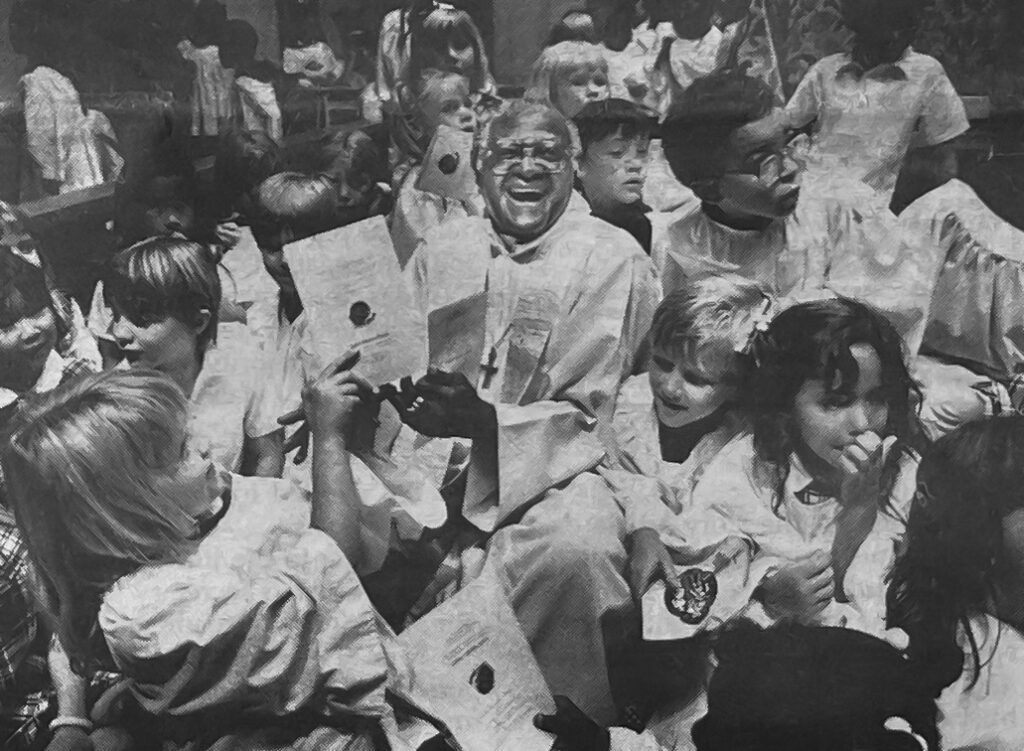
Students from St. Mark’s School in Altadena surround Archbishop Desmond Tutu on chancel steps of St. Mark’s Church during visit on May 16, 1990. Pasadena Star News photo by Eric Draper, reprinted with permission
[The Episcopal News] Whether greeting Altadena schoolchildren or addressing a Santa Ana rally, preaching in Pasadena or keynoting a clergy conference in Santa Barbara, Archbishop Desmond Tutu inspired thousands of Southern Californians to join his efforts to end South African apartheid and build a world that affirms the diverse “rainbow people of God.”
Mourned worldwide since his death Dec. 26 at age 90, Tutu visited the six-county Episcopal Diocese of Los Angeles frequently during the last four decades, creating longstanding ties with Anglican counterparts in the Church in the Province of Southern Africa.
“We Episcopalians from southern California to the central coast join the global outpouring of tribute and gratitude for this peerlessly influential Anglican leader and his example of courage, humility, and compassion,” the Rt. Rev. John Harvey Taylor said of Tutu. “My late mother Jean, a longtime member of All Saints Church in Pasadena, gave me an especially vivid sense of the parish’s international leadership role in supporting the archbishop and standing against the evil of apartheid.”
“We thank you for loving our father, grandfather, husband, uncle, brother, brother-in-law,” said the Rev. Nontombi Naomi Tutu – speaking on behalf of her mother, three siblings, and larger family – during the state funeral held in Cape Town’s St. George’s Cathedral on Jan. 1. “Many of the messages we received have said, ‘Thank you for sharing him with the world.’ Well, it actually is a two-way street. Because we shared him with the world, you shared part of the love you held for him with us, and so we are thankful.
“And we are thankful that all of you have gathered in your many places in person or via the wonders of technology to be a part of celebrating Daddy’s life throughout this week,” added Tutu, who in 2020-21 served as associate rector of All Saints’ Church, Beverly Hills, bringing key insights from her own decades of ministry dedicated to reconciliation and justice.
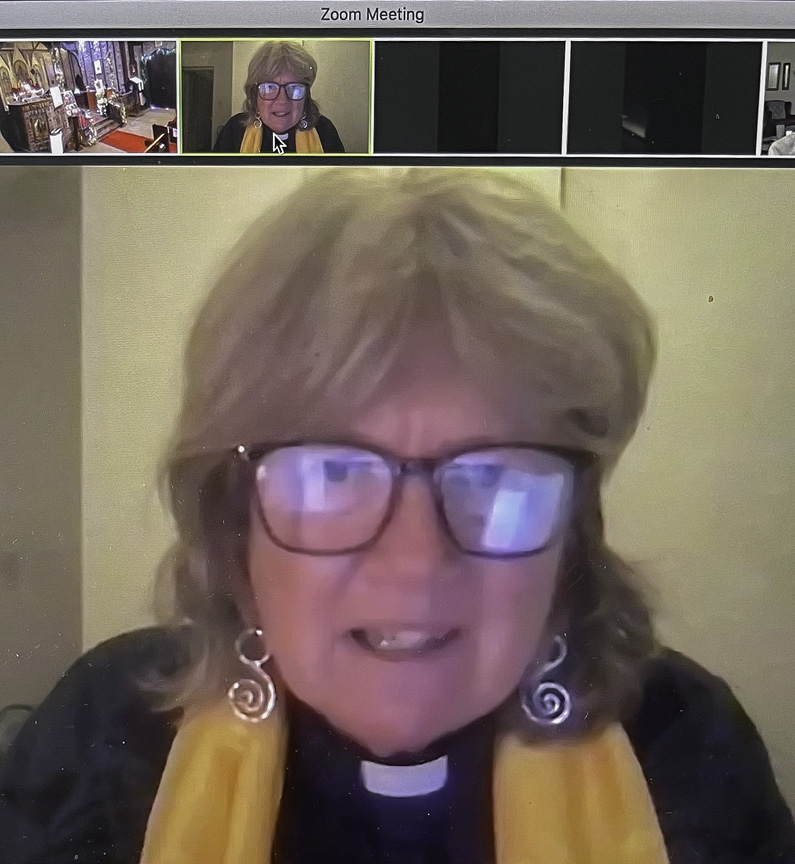
From her home in South Africa, the Rev. Wilma Terry Jakobsen, a former chaplain to Archbishop Tutu, preaches via Zoom during Jan. 2 Eucharist at L.A.’s Church of the Advent.
One such virtual gathering united Southern Californians and South Africans on Jan. 2, the day when Cape Town’s current archbishop, the Most. Rev. Thabo Makgoba, placed Tutu’s ashes in a floor niche near the high altar of St. George’s Cathedral. That evening in Cape Town – across multiple time zones – L.A.’s historic Church of the Advent dedicated its Sunday-morning service to Tutu’s memory, livestreaming a sermon preached from South Africa by the Rev. Wilma Terry Jakobsen.
Ordained by Tutu and his chaplain in the final years of his tenure as archbishop, Jakobsen went on to serve as an assisting priest at All Saints Church in Pasadena, where more than a decade earlier, the parish, under the leadership of the late Rev. Canon George Regas, had established its Center for South Africa Ministry and began hosting Tutu on his various visits to the diocese.
Living the beatitudes
Preaching on the beatitudes enumerated by Jesus in his Sermon on the Mount and giving examples of Tutu’s embodiment of each virtue, Jakobsen said Tutu was a “global icon” because he is “one of few people we can say truly lived out the beatitudes, the values of the beatitudes, and blessed us and the world.”
He “lived out his commitment to liberation theology, which affirms that God is on the side of the poor, the oppressed and marginalized, and that he was transformed by love. He was surrendered to love, to living out God’s love in the world.”
Tutu understood firsthand the power of love to overcome adversity, Jakobsen said, dating from his childhood. He was born Oct. 7, 1931 in Klerksdorp, about 100 miles from Johannesburg, and became a high school teacher before pursuing ordination. (A full biographical retrospective by John Allen, Tutu’s longtime press secretary, is here.)
Some, Jakobsen added, “have said that now he is gone it is the end of an era, the end of the great leaders. But on reflection, it is not the end of an era but of a chapter. There are more chapters coming, and we are the writers.
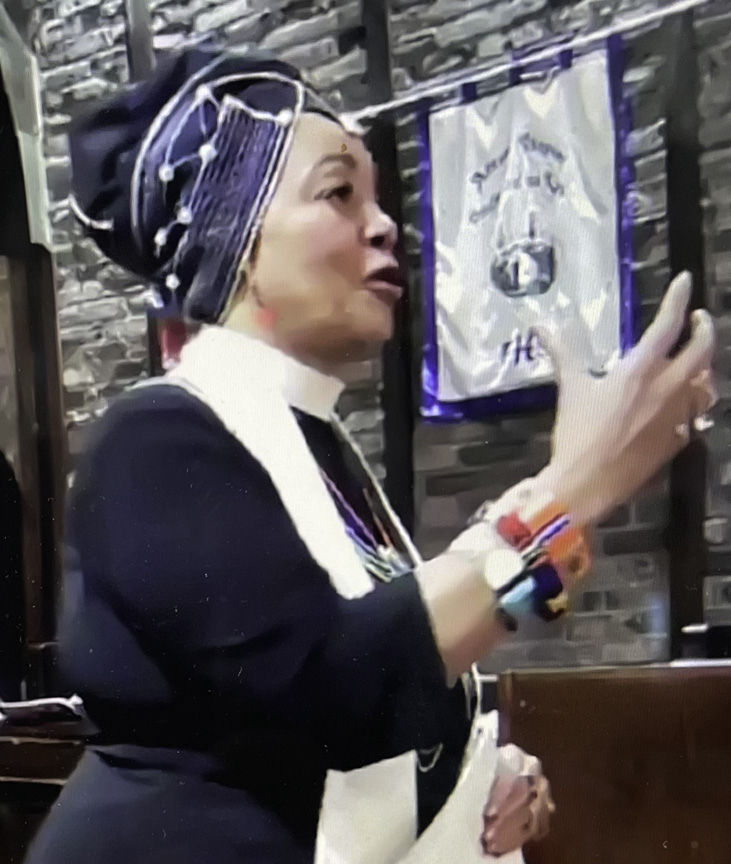
The Rev. Vanessa Mackenzie, rector of L.A.’s Church of the Advent, reflects, during parish’s Jan. 2 Sunday service, on her long association with Archbishop Desmond Tutu. Photo: Screenshot
“We can be like him if we pick up the baton and follow in his footsteps, in his commitments. We too can be transformed by love, surrender to the work of Divine Love and the Sacred in our lives, and passionately commit to transforming the world, to ubuntu, where we are all the people we are because of other people.
“We can live out the message he proclaimed loudly, flinging his arms wide open and saying, All are welcome in God’s kin-dom, all – young and old, black and white, gay and straight, rich and poor, and – causing gasps back in the early 2000s in All Saints Pasadena when he preached – ‘All – from Bush to Bin Laden – all are welcome!’”
Jakobsen closed her sermon (full text here) by addressing Tutu – “May you rest in power, rest in peace” – and with an invitation to her listeners: “May we make this (2022) the year of twenty Tutu.”
Advent’s rector, the Rev. Vanessa Mackenzie, also ordained in South Africa, thanked Jakobsen for her insights and recalled the days the two shared in working for justice – including women’s ordination – in efforts led by Tutu, fondly known as “the Arch.”
Mackenzie underscored ways in which grief and loss are accompanied by joy. “As people of faith we celebrate that death is never the end, death and darkness are not the last word,” she said, also recalling her father – the late Rt. Rev. Edward Mackenzie – who as a bishop suffragan of Cape Town worked with Tutu to end apartheid in South Africa, and in retirement in Los Angeles was active in ministry with his wife, Sylvia, from 2001 until declining health preceded his death in 2020.
Family and ministry ties are also shared by the Rev. Lester Mackenzie, rector of St. Mary’s Church in Laguna Beach, a grandchild of the elder Mackenzies, ordained in the Diocese of Los Angeles by Bishop J. Jon Bruno in 2008.
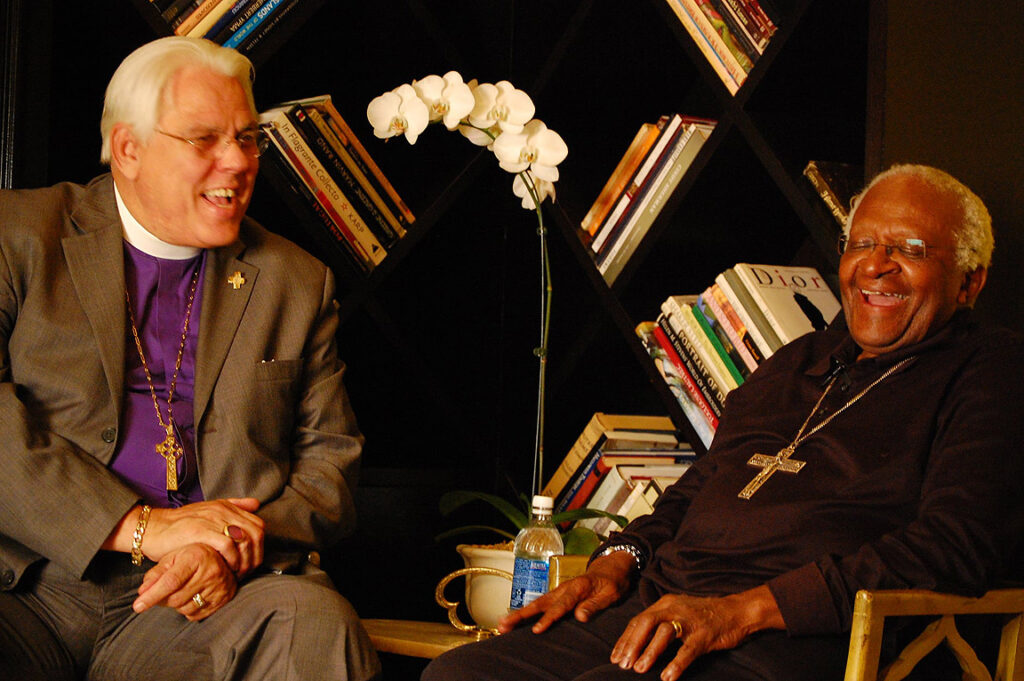
Bishop J. Jon Bruno of the Diocese of Los Angeles and Archbishop Desmond Tutu share a laugh. Photo: Chris Tumilty
Advocating for LGBTQ+, environmental justice
The Mackenzie family was present in 2005 as Bruno welcomed Tutu to Los Angeles for a celebratory visit during which the archbishop emeritus preached at All Saints, Pasadena, on Nov. 6. “You have continued to walk with us with your extraordinary generosities,” he said, thanking the congregation for “loving us and praying for us and saying you want to support ministries” in South Africa, “that beautiful portion of God’s world.”
“Isn’t it sad,” he asked, referring to the experience of the LGBTQ+ community, “that in a time when we face so many devastating problems – poverty, HIV/AIDS, war and conflict – that in our [Anglican] Communion we should be investing so much time and energy on disagreement about sexual orientation? Our communion… which used to be known for embodying the attribute of comprehensiveness, inclusiveness… now is hell-bent on excluding one another. God must look on, and God must weep.”
Excerpts of this homily (full text here) were read aloud in Jan. 2 services streamed from All Saints, where in-person attendance was suspended due to the Omicron viral surge, and where the Rev. Canon Susan Russell’s sermon pointed to ways in which Tutu’s demonstration of the power of “love to transform absolutely anyone and anything” can be applied to today’s issues: “We cannot hide from the fact that our nation is increasingly polarized, our democracy is inarguably under threat, and that liberty and justice for all remains a pledge we make rather than a reality we live,” Russell said, quoting Tutu: “If you want peace, you don’t talk to your friends, you talk to your enemies.”
In 2010 Tutu announced his official retirement from public life, yet he remained a clear voice for justice, decrying political abuses in South Africa, the United States, and around the globe. He also spoke out regularly on environmental issues, taking stands that included his own choice of aquamation, a water-based alternative to cremation by flame, of his body upon death.
“Climate change isn’t just a theory,” he told the Nuclear Age Peace Foundation on a 2011 visit to Santa Barbara. “It is happening.” During his talk he likened public reaction to environmentalists to opinions of peace activists, noting that both were considered “crazy” at first.
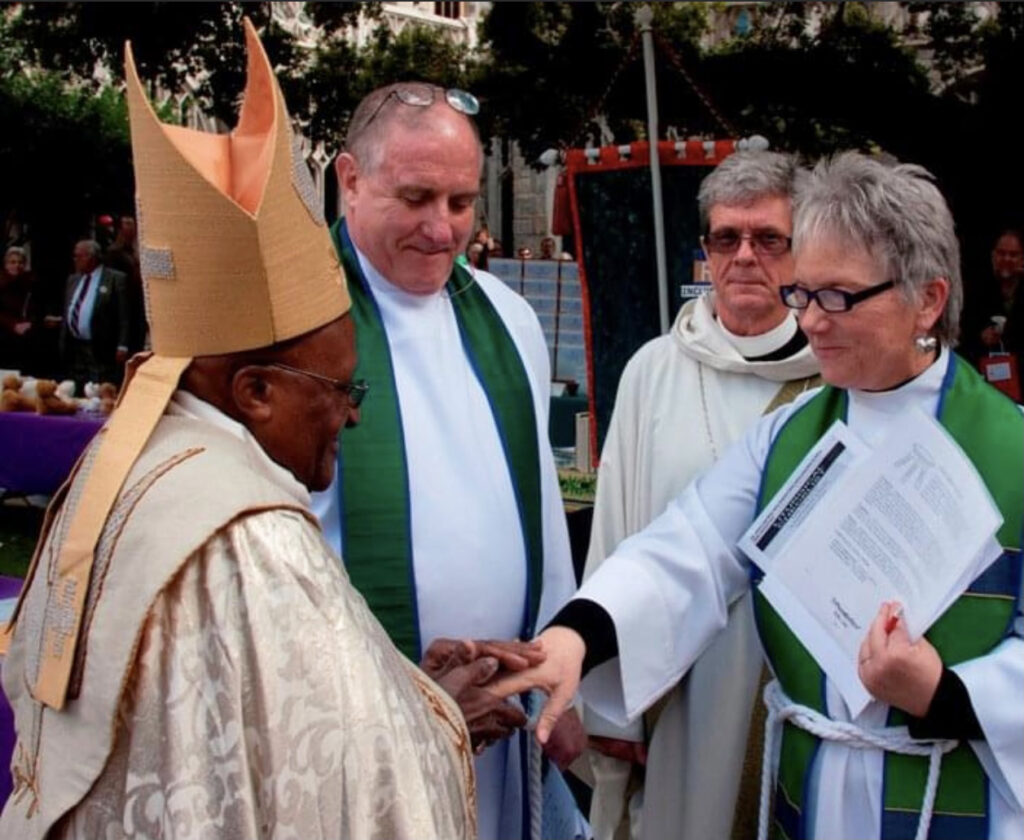
Archbishop Tutu greets Canon Susan Russell in 2011 at All Saints, Pasadena, as rector Canon Ed Bacon and chaplain Canon Ed Sniecienski look on. Photo: Cyrus Davis
Tutu served as an advisory board member for the foundation, which 1990 had presented him with its Distinguished Peace Leadership Award. He often conferred with foundation members during several vacations that he and his wife, Leah, enjoyed in the coastal Summerland area, taking time to visit both All Saints by-the-Sea Episcopal Church in Montecito – notably at the time of his elevation as Archbishop of Cape Town – and the Church of the Epiphany in Oak Park.
These visits often included time with the Regases – Pasadena’s rector emeritus and his wife, Mary – both of whom Tutu, undeterred by treatment for prostate cancer, greeted a final time in 2020 via Zoom, extending 90th birthday greetings to George Regas, who died shortly thereafter on Jan. 3, 2021.
On each visit through the years, Tutu brought with him his characteristic wit and friendliness interspersed with riveting first-hand accounts of his most recent global leadership activities, including his work in chairing South Africa’s Truth and Reconciliation Commission, begun in 1995 and highlighted in his 1999 book No Future Without Forgiveness.
Building early alliances
Tutu’s association with members of the Diocese of Los Angeles increased in the late 1970s, heightened by his 1976 election as bishop in Lesotho and awareness raised during the 1978 Lambeth Conference. In 1984, having declared his solidarity with efforts to end apartheid in South Africa, the late Rt. Rev. Robert C. Rusack, then bishop of Los Angeles, invited Tutu to keynote the diocesan clergy conference held Oct. 7 – 9 that year at Santa Barbara’s Miramar Hotel adjoining All Saints by-the-Sea Church.
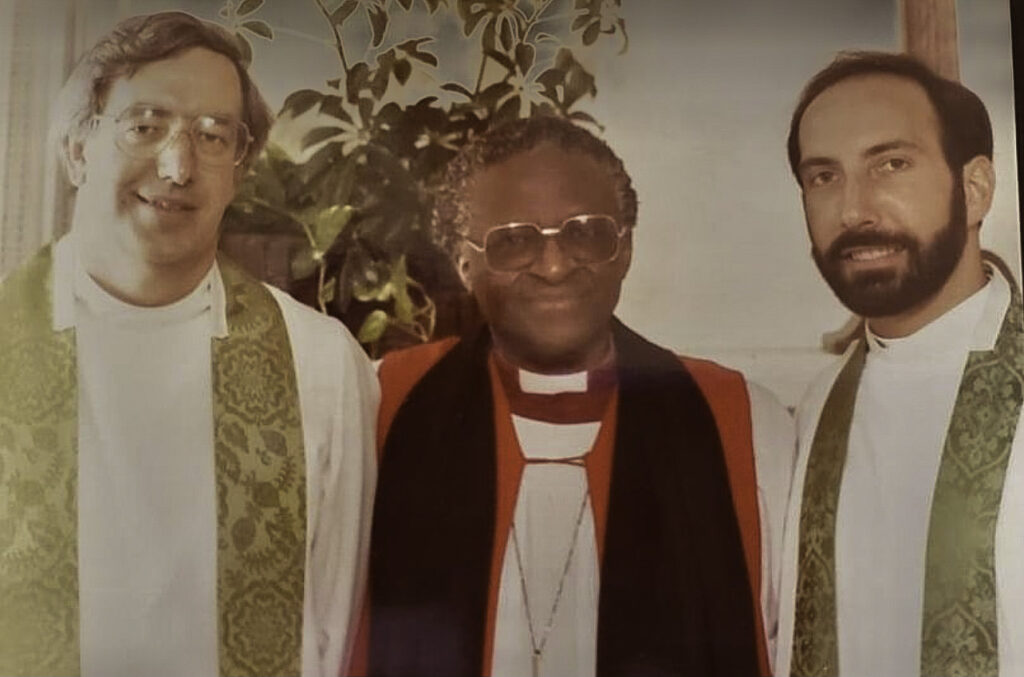
At Montecito’s All Saints by-the-Sea in 1986, then-rector Gethin Hughes (left) and then-associate George Woodward smile with Archbishop Tutu. Photo courtesy George Woodward.
There, expressing his trademark optimism in the face of adversity, Tutu declared, “We are going to be free!” Headlining the November 1984 issue of The Episcopal News, his words had a galvanizing effect on diocesan clergy and laity who joined the world with elation when weeks later, on Dec. 10, 1984, Tutu was presented the Nobel Prize for Peace, having been nominated in 1981, 1982, and 1983.
Writing to congratulate Tutu on his election as archbishop of Cape Town in 1986, Rusack conveyed the prayers and best wishes of the people of the Diocese of Los Angeles.
Local support for Tutu continued toward one of his most notable visits, his May 1990 10-day stay in the Southern California, arranged in partnership with the late Rt. Rev. Frederick H. Borsch, then bishop diocesan. During this visit Tutu and his wife, accompanied by other family members, enjoyed renewing friendships with Borsch and his wife, the late Canon Barbara Borsch. Bishop Borsch went on to co-chair a study section of the Anglican Communion’s 1998 Lambeth Conference with Tutu’s successor, Archbishop Njongonkulu Ndungane.
The timing of the Tutus’ 1990 visit was significant because just days before, on May 4, negotiations to end apartheid in South Africa officially had begun with a meeting of the African National Congress (ANC) and the South African government with representatives gathered at the nation’s presidential residence. Three months earlier, ANC President Nelson Mandela had been freed from his 27-year incarceration on Robben Island.
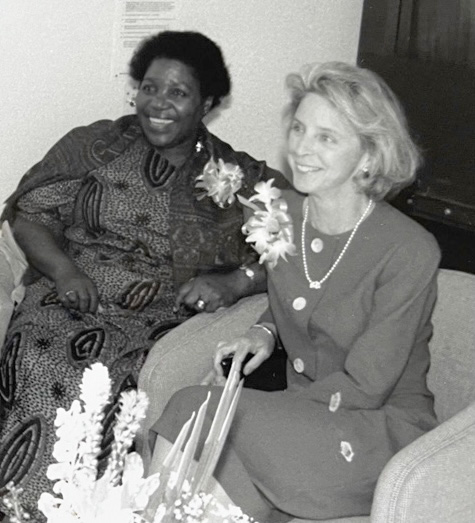
Leah Tutu and Barbara Borsch smile during May 18, 1990 reception at Good Samaritan Hospital, Los Angeles. Photo: County of Los Angeles photo
Of Mandela, Tutu said during a May 17 Los Angeles Biltmore Hotel black-tie benefit that helped raise more than $150,000 for South African refugee scholarships, “On Feb. 11 the whole world watched, and cheered, as this tall black man emerged from prison, smiling, dignified, exuding extraordinary warmth and magnanimity. He still cannot vote.” Six weeks later, on June 29, Mandela would receive a hero’s welcome to Los Angeles with Mayor Tom Bradley presenting the key to the city; South Africa’s first fully democratic elections occurred in 1994. In June 1994, Tutu returned to All Saints, Pasadena – his third visit there since 1984 – preaching a sermon in which he expressed his gratitude for the parish’s ongoing solidarity. He brought the same message to the General Convention’s 1994 meeting in Indianapolis.
A gallery of photos and links from Archbishop Tutu’s 1990 visit and itinerary, with full Episcopal News coverage by the late Canon Ruth Nicastro, is here.
From L.A. City Hall to the Claremont Graduate School, Tutu brought the same message he shared with 1,500 listeners who packed Santa Ana High School’s auditorium on May 21, 1990: “We are inevitably joined together because we are all made in the image of God.”
Organized by Santa Ana’s Episcopal Church of the Messiah, the rally affirmed common cause including the parish’s peaceful protests at an Orange County gas station to decry the oil company’s investments in South Africa. “No one is free until all are free,” Tutu added.
During the rally, Tutu outlined three means of change-making in South Africa, beginning with the right to vote, a franchise that he pointed out was denied to him and the other Blacks who make up 73 percent of the population of South Africa. The second option was violence, which he opposed in all forms but said he understood why Black South Africans resorted to it: “Every day of their lives they encounter legalized, structured violence… the violence inherent in apartheid.” Third, he said, is nonviolent opposition, practiced by the African National Congress since its origin in 1912.
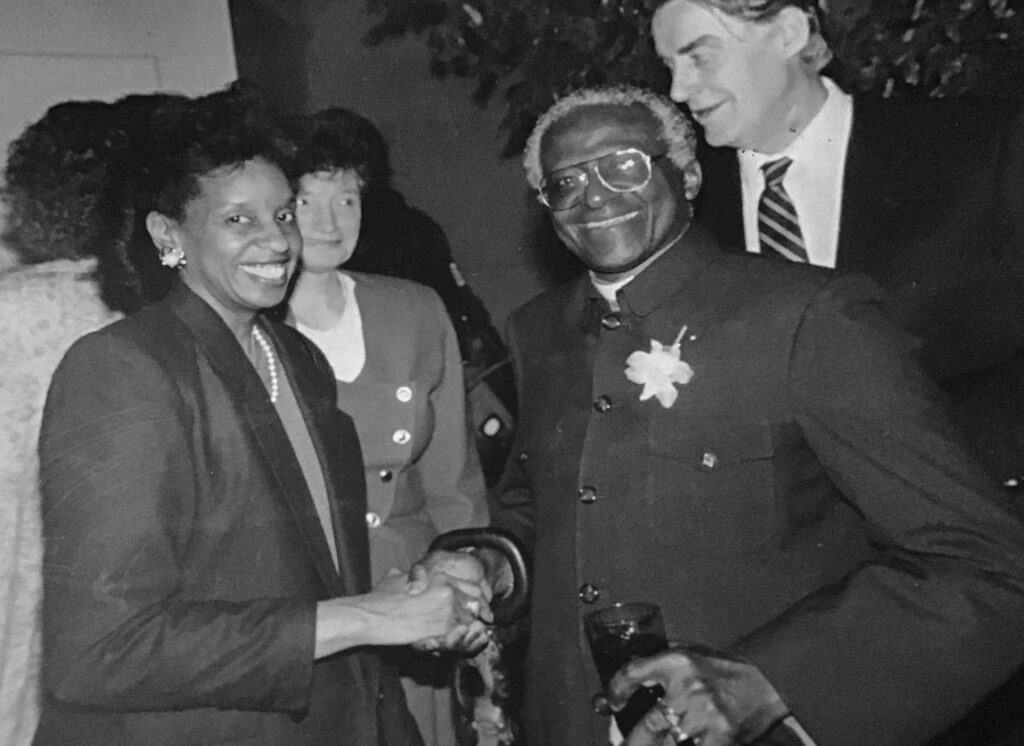
Canon Jamesetta Hammons greets Archbishop Tutu at May 18, 1990 reception at Good Samaritan Hospital, Los Angeles, with the late Canon Jenny Ladefoged and Peter Ladefoged of UCLA pictured in background. Episcopal News photo by Bruce Nickens
Raising similar points, Tutu addressed the Claremont Graduate School where he received the President’s Medal during May 12 commencement exercises. He also spoke at campus gatherings at UCLA, Occidental College, Pasadena’s California Institute of Technology, and the Art Center College of Design. He preached during Sunday morning services at L.A.’s Holman United Methodist Church and during chapel services for Fuller Seminary in Pasadena and World Vision International in Monrovia, also joining an evening prayer service at St. Alban’s Episcopal Church in Westwood. He visited residents of affordable housing created in downtown Los Angeles, and prayed with patients at Good Samaritan Hospital, where a gala reception was held in his honor and attended by the late L.A. County Supervisor Kenneth Hahn.
In Los Angeles – welcomed to City Hall by Mayor Bradley – Tutu preached during a stirring Friday-evening service at St. John’s Church, which in 2008 became the diocese’s pro-cathedral. The service included an anthem drawn from words of Martin Luther King Jr., sung by the parish choir with narration provided by the Rev. Canon Warner Traynham, then rector.
The following Sunday, May 20, Tutu preached to more than 3,000 people in services at All Saints, Pasadena, where on the church lawn several protesters –accompanied by a leashed dog and undeterred by a diocesan staff member who conferred with them across the street – shouted their disagreement with the archbishop’s earlier stance on the importance of a Palestinian state created with support of Jewish leaders. “Please let them say what they want to say,” Tutu said of the demonstrators, “because in my country they are not allowed to do that.”
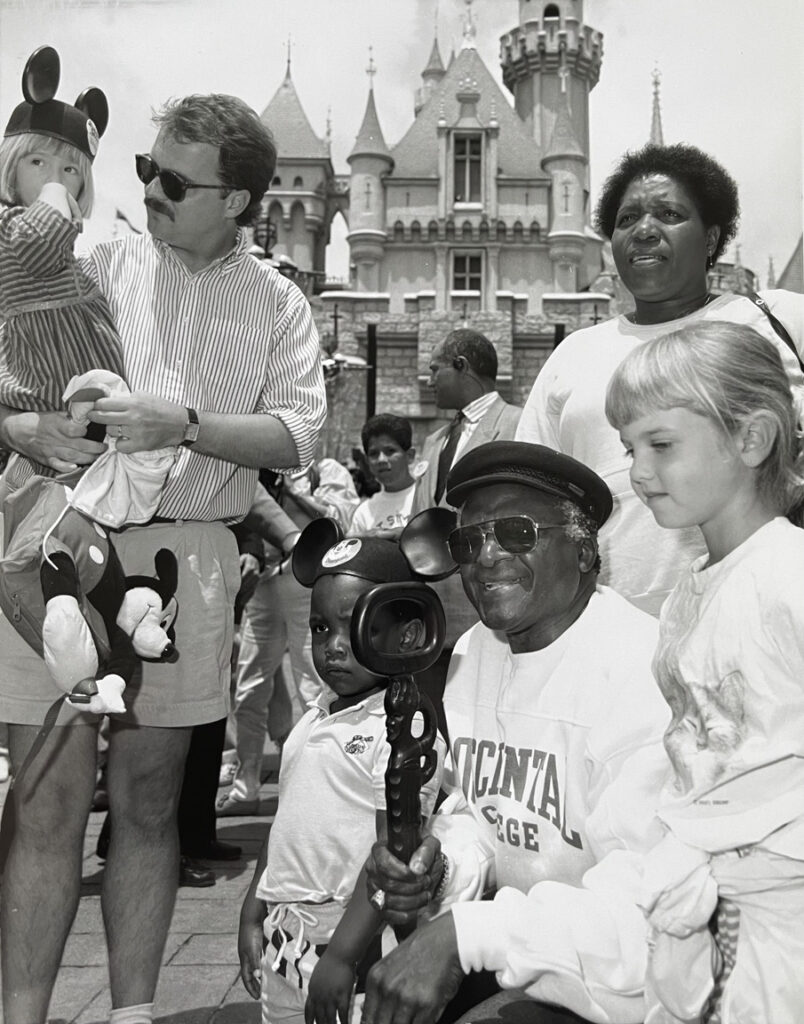
Archbishop Desmond and Leah Tutu, with grandson Xabiso, enjoy a May 19, 1990 Disneyland visit joined by Brian Sellers Peterson of All Saints, Pasadena, and youngsters. Photo courtesy of Disneyland
The day before, in a breakfast hosted by the Pasadena parish’s Center for South Africa Ministry – formed in 1989 and led by Brian Sellers Peterson – Tutu recounted his journey in shaping the central theme of his ministry. In 1975, he said, after being called to a London position with the World Council of Churches and serving as the first Black dean of the Johannesburg cathedral, he contemplated what message he could bring to his people that possibly could “exorcise the horrible demon of self-hate and self-shame” experienced under apartheid. The message was simple, he said: “God loves you” – whoever you are, whatever race you are, no matter what you do. “It was supposed to be the message for Black people,” Tutu recalled, “but the whites wanted to hear it… God says, ‘I created you precisely because I love you. Everything else flows from that fact,’ So, you see, there is no need to pull rank. There is no need to oppress, because you already count. You are a Very Special Person, and so is everyone else.”
Nurturing ‘God’s garden’
Earlier that week, on May 16, Tutu shared a similar message with the children of Altadena’s St. Mark’s Episcopal Church and School, who had raised funds for the church to install a stained-glass window depicting Tutu while also making a $550 donation to his Southern Africa Refugee Scholarship Fund.
Moved by the students’ generosity and welcome, Tutu asked them, “Do you know how beautiful you are? You are like God’s garden. In God’s garden there are tall bushes and tiny little plants, big flowers and little ones, flowers of all colors and shapes. You are big and little, tall and short, and your beautiful faces come in all colors.
“You give me a precious gift to take home to the children of South Africa,” he added, “for I will tell them that the garden God has dreamed of is real. It has come true in St. Mark’s Church, and it will come true for them, too.”
— Robert Williams serves the Diocese of Los Angeles as canon for common life and as archivist-historian. He joined colleagues in staffing Archbishop Tutu’s visits to Southern California from 1990 to 2008.
